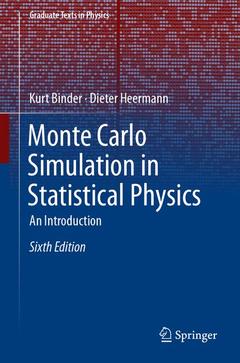Monte Carlo Simulation in Statistical Physics (6th Ed., 6th ed. 2019) An Introduction Graduate Texts in Physics Series
Auteurs : Binder Kurt, Heermann Dieter W.

The sixth edition of this highly successful textbook provides a detailed introduction to Monte Carlo simulation in statistical physics, which deals with the computer simulation of many-body systems in condensed matter physics and related fields of physics and beyond (traffic flows, stock market fluctuations, etc.). Using random numbers generated by a computer, these powerful simulation methods calculate probability distributions, making it possible to estimate the thermodynamic properties of various systems. The book describes the theoretical background of these methods, enabling newcomers to perform such simulations and to analyse their results. It features a modular structure, with two chapters providing a basic pedagogic introduction plus exercises suitable for university courses; the remaining chapters cover major recent developments in the field.
This edition has been updated with two new chapters dealing with recently developed powerful special algorithms and with finite size scaling tools for the study of interfacial phenomena, which are important for nanoscience. Previous editions have been highly praised and widely used by both students and advanced researchers.
Introduction: Purpose and Scope of this Volume, and Some General Comments.- Theoretical Foundations of the Monte Carlo Method and Its Applications in Statistical Physics.- Guide to Practical Work with the Monte Carlo Method.- Some Important Developments of the Monte Carlo Methodology.- Quantum Monte Carlo Simulation: An Introduction.- Monte Carlo Methods for the Sampling of Free Energy Landscapes.- Special Monte Carlo Algorithms.- Finite Size Scaling Tools for the Study of Interfacial Phenomena and Wetting.
Kurt Binder received his Ph.D. at the Technical University of Vienna in1969 with a thesis on Monte Carlo simulations of Ising and Heisenberg magnets, and since then he has pioneered the development of Monte Carlo simulation methods in statistical physics. From 1969 to 1974, Kurt Binder worked at the Technical University in Munich, interrupted by a period as IBM postdoctoral fellow in Zurich in 1972–73. After a stay at Bell Laboratories, Murray Hill, NJ (1974), and a first appointment as Professor of Theoretical Physics at the University of Saarbrücken back in Germany (1974–1977), he held a joint appointment as Full Professor at the University of Cologne and as one of the Directors of the Institute of Solid State Research at Jülich (1977–1983). He has held his present position as Professor of Theoretical Physics at the University of Mainz, Germany, since 1983, and since 1989 he has also been an external member of the Max Planck Institute for Polymer Research in Mainz. Kurt Binder has written more than 1100 research publications and edited 5 books on computer simulations. He received the German Physical Society’s Max Planck Medal in 1993. He is an Editorial Board member of several journals and has served as Chairman of the IUPAP Commission on Statistical Physics. In 2001 he was awarded the Berni Alder CECAM prize by the European Physical Society. In 2007 he received the Boltzmann Medal from the International Union of Pure and Applied Physics and an honorary Ph.D. degree in Chemistry from the Marie-Curie-Sklodowska University (Lublin, Poland), and was named one of the first Gutenberg Fellows at the University of Mainz. In 2009 he was the winner of the Lennard-Jones Prize awarded by the Statistical Mechanics and Thermodynamics Group of the Royal Society of Chemistry in recognition of his outstanding contribution to the field of thermodynamics. He retired from office in 2012, but is still active in research. From 2011 to 2017 he has been the Chairman of the Sc
Features exercises and a modular structure, making it highly suitable for university courses
Updates the widely used and cited previous editions with chapters on powerful special algorithms and finite scaling tools for the study of interfacial phenomena
Serves as authoritative introduction by leading experts in the field
Date de parution : 05-2019
Ouvrage de 258 p.
15.5x23.5 cm
Disponible chez l'éditeur (délai d'approvisionnement : 15 jours).
Prix indicatif 79,11 €
Ajouter au panierThèmes de Monte Carlo Simulation in Statistical Physics :
Mots-clés :
computer simulation and modeling of many-body systems; Monte Carlo methods in statistical physics; Monte Carlo sampling methods; textbook on Monte Carlo method; textbook on statistical physics; quantum Monte Carlo simulation; special Monte Carlo algorithms; Interfacial Phenomena and Wetting



